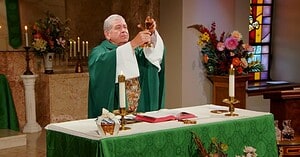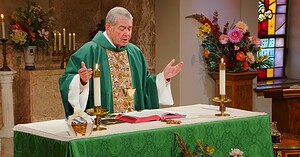Seventeenth Sunday in Ordinary Time
Homily Video
Seventeenth Sunday in Ordinary Time Homily Transcript
To me this is a very, very beautiful
Profound gospel passage.
You know Jesus gives a whole series
Of teachings throughout his ministry.
You look at the parables about how we need to be
Fertile soil so the word of God can grow in us.
You look at the parables about the kingdom of God.
You look at the parables about the end times.
And then Jesus gives this what we’re reading today
Teaching on prayer.
So I love this because to me prayer is so necessary,
It’s so central for me personally
But I just, I think for most people
At least hopefully it could be or it should be.
Prayer being in touch with God.
So first the disciples of John the Baptist
Have been taught by John the Baptist how to pray.
Now this is kind of interesting.
We don’t know what John taught his disciples
And we could, I guess, surmise that it would have been
More of a silent sort of contemplative prayer.
Even though John was a preacher
On the Jordan River baptizing people,
John was what was called an essene.
So he was kind of like a hermit in the desert.
So as a hermit in the desert John would have spent
Most of his hours in solitude, in silence.
And so when he’s resting in solitude, in silence,
John is opening his heart up to receive God.
Maybe not a lot of words are being communicated
But John is deeply centered in the lord.
So John would have taught his disciples basically
How to do this sort of silent contemplative sort of prayer.
So I say contemplative prayer,
We’re not talking about like having a lot of thoughts,
Maybe not even a lot of images either.
Versus more kind of like mental vocal prayer
Is what Jesus now is teaching his disciples.
So he’s not saying John’s way of praying is bad,
It’s just here’s another technique.
We’re not going to be silent just trying
To meditate in stillness but we’re actually going to talk.
So he gives the our father’
Which is a vocal sort of formulaic prayer.
We all know this.
We have the hail Mary as well.
Think of all the prayers we have in our catholic faith,
In our Christian tradition.
Those are legitimate forms of praying.
Even the mass itself is a form of prayer.
But then Jesus gives this image or this parable
Of asking, the son asking the father
For a piece of fish or whatever it is.
This is really important in our spiritual lives.
So yes, there’s a time for silence.
Yes, there’s a time for the formulaic sort of prayers
Or whatever they may be.
But then there’s a time for dialogue with God.
And often in dialoguing with God, we’re petitioning God
Because our hearts are yearning for something.
So we ask God, we express our hopes to God.
Maybe we express our disappointment.
We relate to God our fear.
Think of our first reading with Abraham.
Again, Abraham is a beautiful model of faith and prayer.
He’s bargaining with God more or less to try to save Sodom.
First of all, which is incredible
Because it wasn’t like Sodom, Gomorrah had treated
Abraham all that well.
But Abraham has a generous heart.
And what’s kind of crazy is there’s not less than,
There’s not ten innocent men
Because Sodom ends up getting destroyed.
But you see Abraham is talking with God.
Hey, will you save it for 50?
Will you save it for 45?
And so forth.
So Jesus is saying, look,
You want something, bring it to the lord.
You’re hurting over something.
Talk to me about it.
Relate it to me.
So in our spiritual lives, I think as Christians,
As Catholics, we struggle with this because we think,
Well, I feel like I’m talking to a wall,
Like no one’s responding to me.
I don’t hear God speaking back to me.
Or maybe we think it’s selfish to pray for myself.
You know, or we have our checklist of prayers
That we got to do.
You know, we got to say our rosary,
We got to say our divine mercy chapel,
We got to pray for all those people
That are sick in our world.
We never leave time for ourselves.
Think about how you relate to your spouse
Or to your best friend.
They want to hear how you’re doing.
You want to talk.
And we’ll realize when we’re talking,
When we’re relating, that’s much more fulfilling
Than the answer to our prayer.
So give it a shot.
Talk to God about how you’re doing today.
Ask him for something that’s deep on your heart
And know that our lord will give it to you.
Amen.
Readings
Featured Text
Discover More
Sixth Sunday in Ordinary Time
February 15, 2026
Fifth Sunday in Ordinary Time
February 8, 2026
Fourth Sunday in Ordinary Time
February 1, 2026
Request Sunday Mass Guide
The Sunday Mass Guide sent to your home address
Spiritual nourishment and updates from the Sunday Mass community
Monthly reflections from Fr. Scott Donahue, our Principal Celebrant


